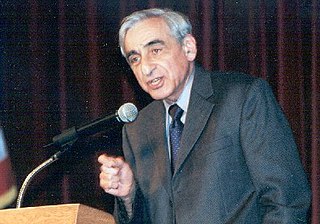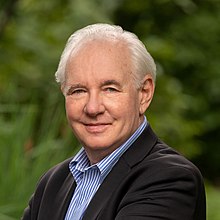
Jacksonian democracy was a 19th-century political philosophy in the United States that expanded suffrage to most white men over the age of 21 and restructured a number of federal institutions. Originating with the seventh U.S. president, Andrew Jackson and his supporters, it became the nation's dominant political worldview for a generation. The term itself was in active use by the 1830s.
Gil Troy is an American presidential historian and a popular commentator on politics and other issues. He is a professor of history at McGill University. Troy is the author of nine books, and the editor of two. He writes a column for The Daily Beast on forgotten history, putting current events in historical perspective and is a columnist for The Jerusalem Post.

Michael Laban Walzer is an American political theorist and public intellectual. A professor emeritus at the Institute for Advanced Study (IAS) in Princeton, New Jersey, he is editor emeritus of the left-wing magazine Dissent, with which he has been affiliated with since his years as an undergraduate at Brandeis University, an advisory editor of the Jewish journal Fathom, and sits on the editorial board of the Jewish Review of Books.

Cass Robert Sunstein is an American legal scholar known for his work in constitutional law, administrative law, environmental law, and behavioral economics. He is also The New York Times best-selling author of The World According to Star Wars (2016) and Nudge (2008). He was the administrator of the White House Office of Information and Regulatory Affairs in the Obama administration from 2009 to 2012.

The values and ideals of republicanism are foundational in the constitution and history of the United States. As the United States constitution prohibits granting titles of nobility, republicanism in this context does not refer to a political movement to abolish such a social class, as it does in countries such as the UK, Australia, and the Netherlands. Instead, it refers to the core values that citizenry in a republic have, or ought to have.

Allan Jay Lichtman is an American historian. He has taught at American University in Washington, D.C., since 1973.

Seymour Martin Lipset was an American sociologist and political scientist. His major work was in the fields of political sociology, trade union organization, social stratification, public opinion, and the sociology of intellectual life. He also wrote extensively about the conditions for democracy in comparative perspective. He was president of both the American Political Science Association (1979–1980) and the American Sociological Association (1992–1993). A socialist in his early life, Lipset later moved to the right, and was considered to be one of the first neoconservatives.

Edward John Larson is an American historian and legal scholar. He is university professor of history and holds the Hugh & Hazel Darling Chair in Law at Pepperdine University. He was formerly Herman E. Talmadge Chair of Law and Richard B. Russell Professor of American History at the University of Georgia. He continues to serve as a senior fellow of the University of Georgia's Institute of Higher Education, and is currently a professor at Pepperdine School of Law, where he teaches several classes including Property for the 1Ls.

Daniel J. Kevles is an American historian of science best known for his books on American physics and eugenics and for a wide-ranging body of scholarship on science and technology in modern societies. He is Stanley Woodward Professor of History, Emeritus at Yale University and J. O. and Juliette Koepfli Professor of the Humanities, Emeritus at the California Institute of Technology.
The Lodge Bill of 1890, also referred to as the Federal Elections Bill or by critics as the Lodge Force Bill, was a proposed bill to ensure the security of elections for U.S. Representatives.
These are the references for further information regarding the history of the Republican Party in the U.S. since 1854.
Leon Frank Litwack was an American historian whose scholarship focused on slavery, the Reconstruction Era of the United States, and its aftermath into the 20th century. He won a National Book Award, the Pulitzer Prize for History, and the Francis Parkman Prize for his 1979 book Been In the Storm So Long: The Aftermath of Slavery. He also received a Guggenheim Fellowship.
Sidney Verba was an American political scientist, librarian and library administrator. His academic interests were mainly American and comparative politics. He was the Carl H. Pforzheimer University Professor at Harvard University and also served Harvard as the director of the Harvard University Library from 1984 to 2007.

Pippa Norris is a British American political scientist specializing in comparative politics. She is the McGuire Lecturer in Comparative Politics at the Harvard Kennedy School at Harvard University, and she has served as the Australian Laureate Fellow and Professor of Government and International Relations at the University of Sydney, and Director of the Electoral Integrity Project.
Vote early and vote often is a generally tongue-in-cheek phrase used in relation to elections and the voting process. Though rarely considered a serious suggestion, the phrase theoretically encourages corrupt electoral activity, but is used mostly to suggest the occurrence of such corruption.
Daniel T. Rodgers is an American historian. He is an emeritus professor at Princeton University, and the author of several books.

Sheila Sen Jasanoff is an Indian American academic and significant contributor to the field of Science and Technology Studies. In 2021 she was elected to the American Philosophical Society. Her research has been recognized with many awards, including the 2022 Holberg Prize "for her groundbreaking research in science and technology studies."
Jared Farmer is the Walter H. Annenberg Professor of History at the University of Pennsylvania. He specializes in environmental history, landscape studies, and the North American West.

The 1940 United States presidential election in Florida was held on November 5, 1940, as part of the concurrent United States presidential election. Florida voters chose seven electors, or representatives to the Electoral College, who voted for president and vice president.
Franklin's Jackass is a reference to a witticism allegedly made by Benjamin Franklin, in which he derided property qualifications on the right to vote by asking whether the right to vote belongs to the man or to the jackass that he owns. According to Alexander Keyssar, it was a widely known reference in the American Revolutionary Era and was mentioned at several state constitutional conventions in the years after the American Revolution.











